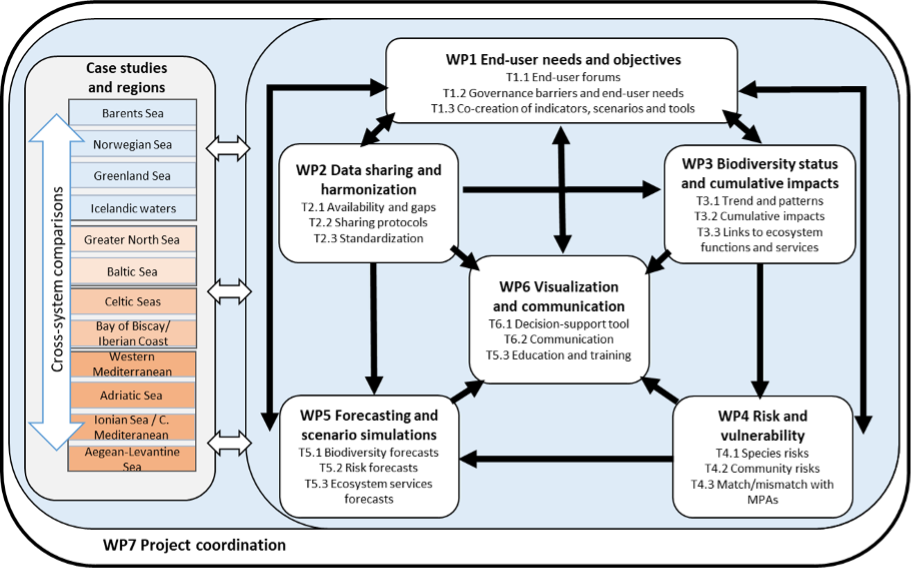B-USEFUL WPs and deliverables
WP1
End-user needs and project co-creation
This WP will identify, discuss the key needs, and capture the insights, of marine biodiversity spatial planning users. This constituted user forum will include not only managing and policy-designing users regularly working with biodiversity data for regulatory needs, but also NGO and industry stakeholders who have to use information generate from this data. This user forum identifies key barriers to marine conservation, while co-creating indicators, scenarios and decision-support tools (DSTs) together with partners in order to overcome these barriers and challenges. Furthermore, the end-user forum is also involved in the co-dissemination of projects outputs and outcomes.
D1.1 Description of user forum
D1.2 Barriers to biodiversity conservation and information needs including dimensions to include in indicators
Lead responsible for the report: Kåre Nolde Nielsen,
UiT – The Arctic University of Norway ">kare.nolde
Submission date: 31.10.2024
Downloads
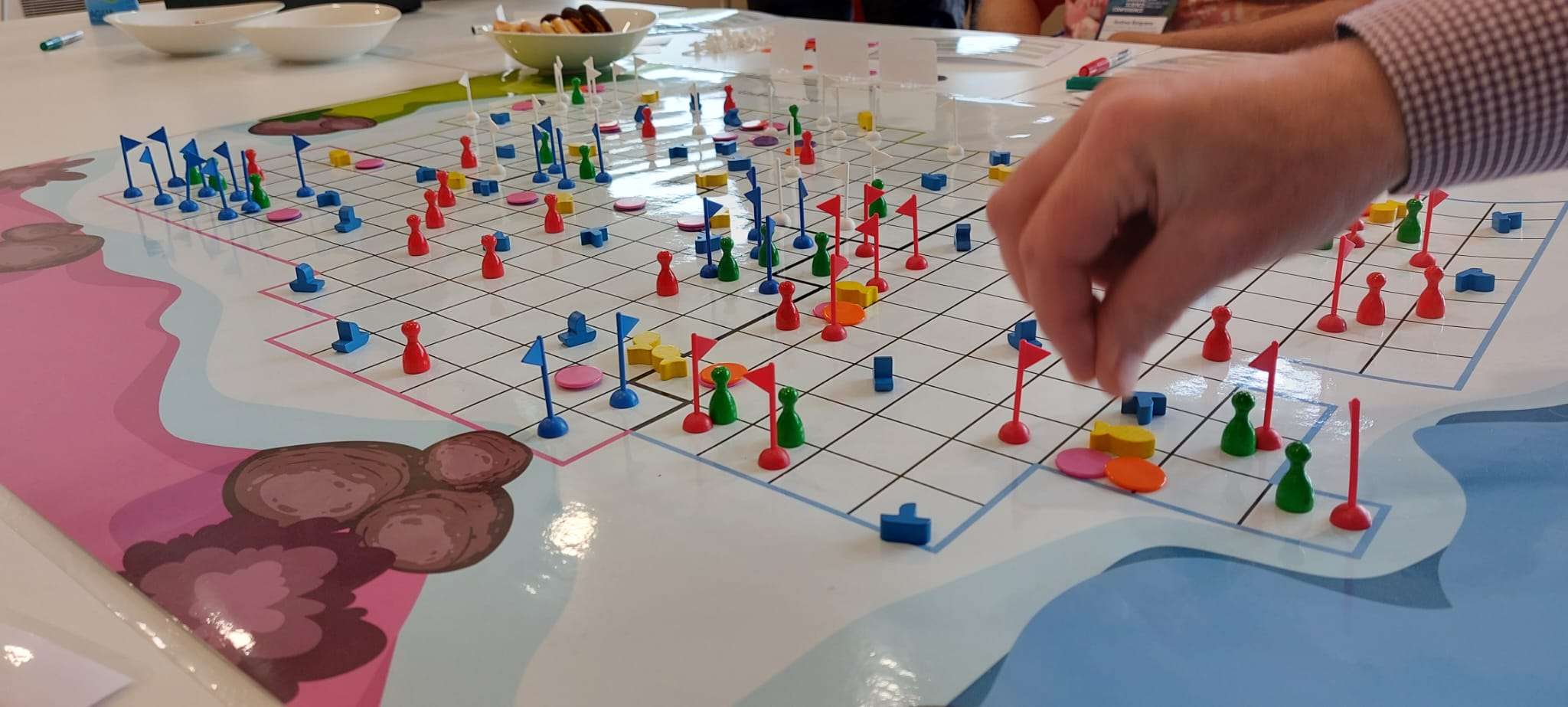
The iBlue game reflects key decisions and information needs of end-users engaged in marine conservation and spatial planning.
D1.3 Co-creating monitoring tools and scenarios for marine biodiversity
WP2
Data integration and harmonization
The aim of WP2 is to further the harmonisation, mobilisation, and uptake of available monitoring and environmental data forming the basis to better characterise and understand the status and cumulative pressures
acting on marine biodiversity and sensitive habitats across European Seas. This overarching aim is addressed through the following specific objectives: (i) identify available sources and gaps of biodiversity and pressure data across case study areas; (ii) develop transparent protocols for sharing and exchange of data; iii) develop methods and procedures for correcting and standardizing raw monitoring data within and across survey.
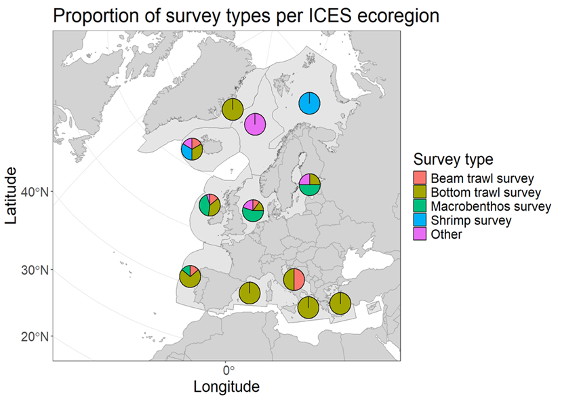
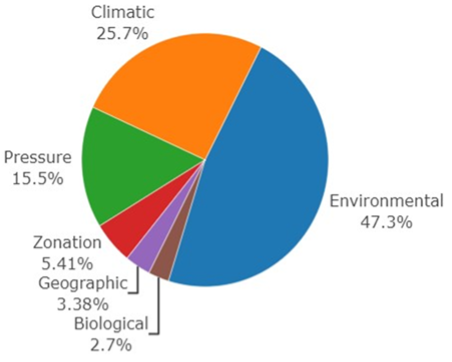
Examples of WP2 activities including online meta data catalogues of available monitoring surveys and information across European Seas
D2.1 Preliminary Data Management Plan
Lead responsible for the report: Neil Holdsworth,
International Council for the Exploration of the Sea,
Submission date: 30.03.2023
D2.2 Report of available meta data and data gaps across case studies
Lead responsible for the report: Maria Teresa Spedicato, FONDAZIONE COISPA ETS,
Submission date: 22.03.2024
D2.3 Data management plan and report on data sets and data sharing protocols
Lead responsible for the report: Vaishav Soni, International Council for the Exploration of the Sea,
Submission date: 30.09.2024
D2.4 Report on data standardisation methods and applications
Lead responsible for the report: Heino O. Fock
Submission date:
Downloads
WP3
Biodiversity status and cumulative impacts
This WP aims to assess the status, trends, and cumulative impacts of pressures acting on multiple biodiversity indicators and establish their links to ecosystem functions and services across European Seas. More specifically, we use a set of statistical tools and methods capable of integrating multiple sources of data from WP2, including observations of species occurrence and abundances, traits and environmental conditions. After proper cross-validation, the set of trained and parameterized models are used to generate maps and trends in a suite of biodiversity indicators, such as the taxonomic and functional richness and evenness (see figure below). Furthermore, we investigate state-pressure relationships and cumulative impacts on biodiversity arising from multiple natural and human stressors (e. g., fishing, eutrophication and climate change), as well as quantify potential links and relationships between biodiversity indicators and estimates of ecosystem functions and their associated services for human well-being (e. g., food provisioning).
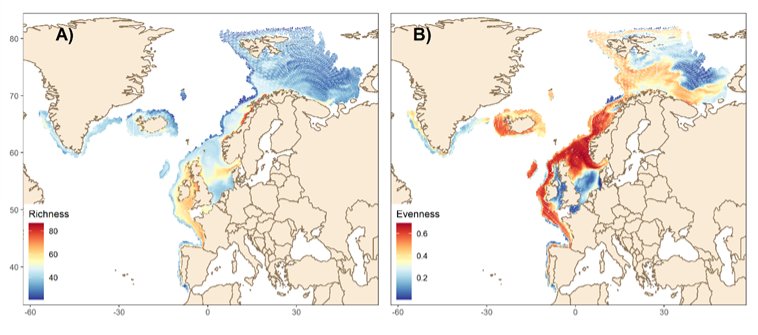
Example maps of key biodiversity indicators, here illustrated by the mean estimated richness and evenness of demersal (bottom-living) fish species based on a joint-species distribution model setup for the NE Atlantic shelf seas
D3.1 Report on temporal trends and spatial patterns of multiple biodiversity indicators
Lead responsible for the report:
Martin Lindegren (DTU)
Submission date: 30.09.2025
Downloads
D3.2 Report on state-pressure relationships and cumulative impacts across European waters
Lead responsible for the report:
Manuel Hidalgo (CSIC)
Submission date: 31.01.2026
Downloads
D3.3 Report on relationships between biodiversity and ecosystem functions and service
WP4
Risk and vulnerability
WP4 is aimed at identifying habitats and key species at risk of extinction in sensitive ecosystems by developing a hierarchical risk-based framework advancing upon that used by IPCC to assess climate risk (IPCC, 2014). To achieve this aim WP4 will pursue the following objectives: (1) identify species and/or habitats particularly at risk in different regional European seas; (2) assess trends and patterns of community level risk to inform potential adaptation or mitigation actions; and (3) assess spatial overlap, or potential mismatch, between hotspots of biodiversity, risks, and current marine protected areas.
D4.1 Report on species and/or habitats particularly at risk in different European regional seas
Lead responsible for the report:
Georg H. Engelhard, Cefas,
Submission date: 30.09.2024
Downloads
- D4.1 B-USEFUL Report (PDF, 5 MB)
- D4.1 B-USEFUL Supporting material ALL (ZIP, 366 KB)
- D4.1 APPENDIX 1 Cantabrian WMed fish inverts (ZIP, 366 KB)
- D4.1 APPENDIX 2 Northeast Atlantic fish (ZIP, 250 KB)
- D4.1 APPENDIX 3 WMed fish inverts comm ncom (ZIP, 53 KB)
- D4.1 APPENDIX 4 NorthSea inverts SE.RE.VU (ZIP, 30 KB)
D4.2 Report on community-level risk scores and ‘hotspots’ for different European regional seas
Lead responsible for the report:
Marcel Rozemeijer (Wageningen Marine Research)
Submission date: 30.09.2025
Downloads
D4.3 Report on spatial overlap analysis of European marine protected areas and those areas identified as ‘hotspots’ of risk from anthropogenic pressures including climate change
WP5
Forecasting and scenario simulations
WP5 aims at producing short- to mid-term forecasts of marine biodiversity and its vulnerabilit across European Seas, as well as provide trajectories in ecosystem functions and their associated services. To achieve this aim WP5 will pursue the following objectives: (i) perform seasonal-to-decadal forecast of species distributions and biodiversity indicators, (ii) assess changes in species and/or habitats’ risk and vulnerabilities, and (iii) forecast changes in ecosystem functions and services. An end-product of this work package tailored to end-user needs will be (iterative) spatial maps of seasonal-to-decadal forecasted biodiversity, risk, and
vulnerability indicators (to WP6).
D5.1 Report on predictions of marine biodiversity in European Seas
D5.2 Report on projected risks and vulnerabilities of species and communities
D5.3 Report on scenario-based projections of biodiversity, ecosystem functions and services
WP6
Decision-support and outreach to policy and training
WP6 focuses on the delivery of project findings through three strands: decision-support, policy and training. Its main outcome will be to develop a tailored Science-Policy Interface (SPI) on Conservation of Biodiversity and Ecosystem Services targeted at end-user needs (as identified in WP1). Specifically, WP6
will facilitate and enhance the conservation of biodiversity and sustainable ecosystem services using innovative decision-support tools (T6.1), knowledge communication and synthesis (T.6.2) and through education and outreach (T.6.3). This will be achieved through the following objectives: (i) Providing science based evidence for decision support and biodiversity conservation; (ii) Facilitating of the Science Policy Interface and Project Synthesis; (iii) Science for training and education within and beyond academia.
D6.1 Online, decision-support platform developed, approved by end-users and launched
D6.2 Plan for adaptive management to support decision-making in response to end user and policy needs at the different levels
Lead responsible for the report:
Ute Jacob, AWI
Submission date: 30.09.2024
Downloads
D6.3 Exploitation & Dissemination Strategy in direct support of KPIs for Impact
D6.4 Project knowledge dissemination via the Science-Policy Interfaces with user activities (roundtable and capacity building) to support
D6.5 Compilation of high-end evidence report for end user needs
D6.6 E-learning platform for education and training launched
WP7
Project coordination
D7.1 Submission of periodic report M18
The overall objective of WP7 is to ensure efficient and effective project administration across the consortium, facilitating communication between the project partners and the Commission and leading to the successful completion of the B-USEFUL workplan and fulfilment of all requirements and obligations of the EC Grant Agreement.
Lead responsible for the report: Martin Lindegren,
DTU Aqua, National Institute of Aquatic Resources,
Submission date: 30.03.2023
